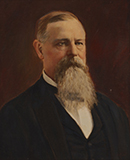What can you call a Baptist minister who was the first native Texan to serve as president of Baylor University? A socialist.
 Reddin Andrews (Baylor University archive)Reddin Andrews, born in La Grange, graduated from Baylor in 1871, completed advanced seminary studies in Greenville, S.C., and returned to serve as a pastor in several Texas cities. The Bernie Sanders candidacy this year has raised awareness of socialism and democratic socialism, gaining many new admirers, as well as detractors who think of socialism and economic democracy as movements totally alien to the American experience and certainly the Christian experience.
Reddin Andrews (Baylor University archive)Reddin Andrews, born in La Grange, graduated from Baylor in 1871, completed advanced seminary studies in Greenville, S.C., and returned to serve as a pastor in several Texas cities. The Bernie Sanders candidacy this year has raised awareness of socialism and democratic socialism, gaining many new admirers, as well as detractors who think of socialism and economic democracy as movements totally alien to the American experience and certainly the Christian experience.
Reddin Andrews would beg to differ.
Andrews returned as a faculty member to his alma mater while the institution was still at Independence, and he advanced to the presidency after the death of his close friend, William Carey Crane. When Baylor merged with Waco University, Andrews relocated to Central Texas, serving as a vice president under Rufus Burleson and continuing an active role in Baptist life through preaching and denominational leadership.
Concerned about poverty, Andrews became convinced both democracy and Christianity demanded challenges to unregulated capitalism. The most faith-filled response to the economic order, for Andrews, was a socialist vision.
Andrews was far from alone. The history of the Lone Star State is replete with progressive movements, including three socialist parties. Andrews became a leader in one of those parties, serving as the nominee for governor in 1910 and 1912 and doing quite well in a state that was part of the Democratic Party’s Solid South. In fact, in the 1912 election, Andrews came in second in a field of six, outpolling the Republican, Progressive, Prohibition and Socialist Labor candidates.
Speaking of the Socialist Labor party, Andrews’ version of religiously motivated, non-Marxist, democratic socialism reminds us economic reform movements under the socialist banner have not been of one mind.
In one of his 1910 campaign appearances, Andrews traveled to Palestine to speak at a three-day gathering of socialist leaders. Far from flaming hysteria, the non-socialist oriented Palestine Daily Herald welcomed the gathering of Reds to the East Texas town. Andrews asked his old teacher, Professor J.G.H. Buck, to attend the political forum and introduce all the speakers. Buck, a non-socialist decidedly opposed to socialist economics, eagerly agreed. In an editorial in the local paper, Buck stated his enthusiasm for participating in the democratic process, reporting he and Andrews had shared many conversations and little agreement. In spite of their differences, they shared a common humanity and belief in democratic principles. They also shared a commitment to civility in discourse or, as Buck stated, common courtesy. “I accept it as a compliment,” Buck wrote, “that he asks me to introduce his party leaders.”
And just who appeared on the program with Reddin Andrews? Two leaders with longer tenures in the national socialist movement. Mary O’Reilly, a Chicago native who would become active in the Socialist Party of America, came to Palestine, along with Thomas Hickey, a native of Ireland who journeyed to America and quickly became an active socialist and associate of Eugene Debs.
Sign up for our weekly edition and get all our headlines in your inbox on Thursdays
Those three days in Palestine certainly impressed Hickey so much, he relocated to Texas and was Andrews’ running mate for lieutenant governor in 1912. Such was the company kept by Andrews—Baylor alumnus, ordained Baptist and committed socialist politician. And such was the warm greeting given by Andrews’ friend and teacher, who disagreed with his politics and valued his friendship enough to welcome the socialists to Palestine.
Merrill Hawkins is professor of religion at Carson-Newman University in Jefferson City, Tenn.
















We seek to connect God’s story and God’s people around the world. To learn more about God’s story, click here.
Send comments and feedback to Eric Black, our editor. For comments to be published, please specify “letter to the editor.” Maximum length for publication is 300 words.